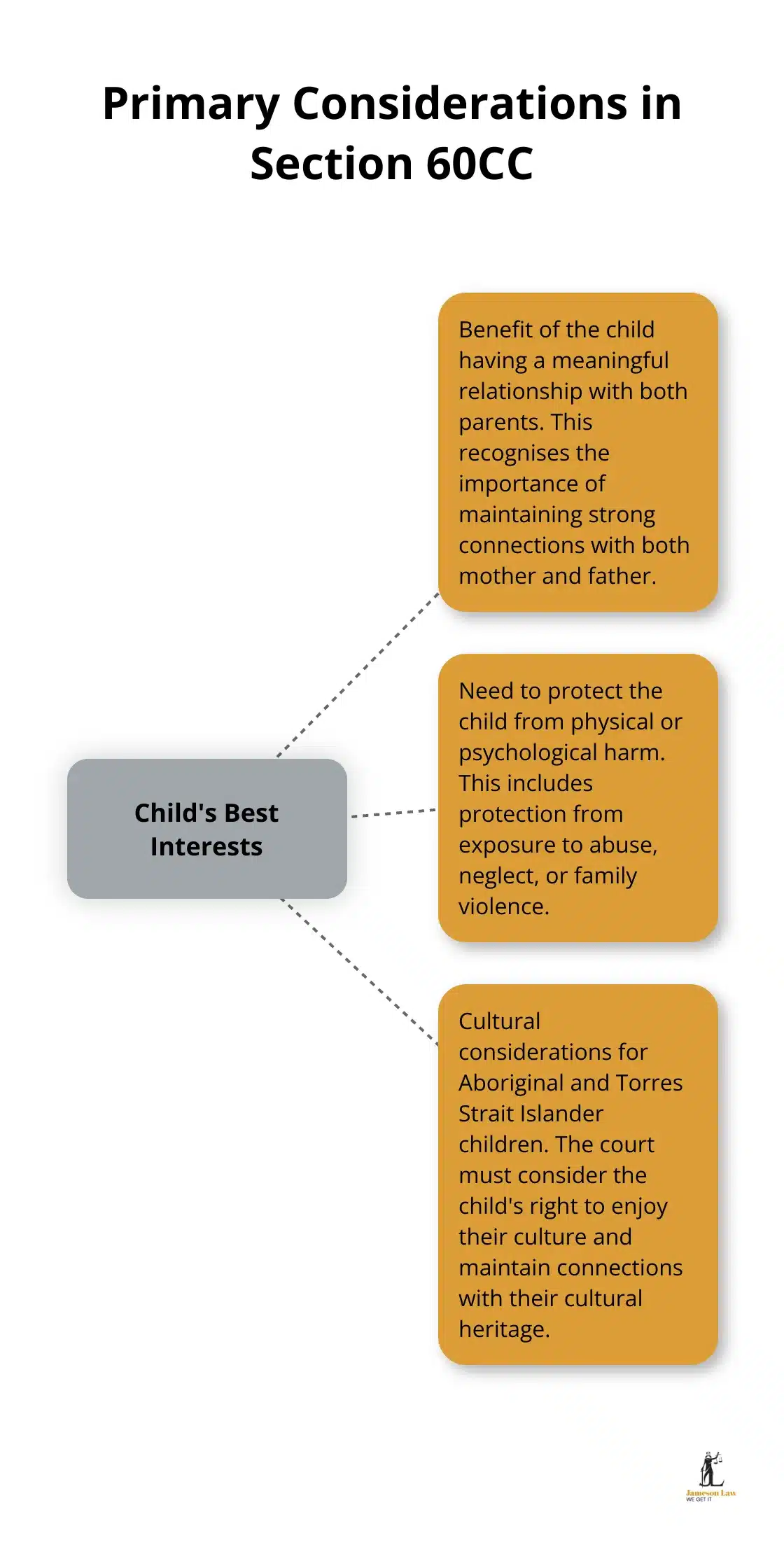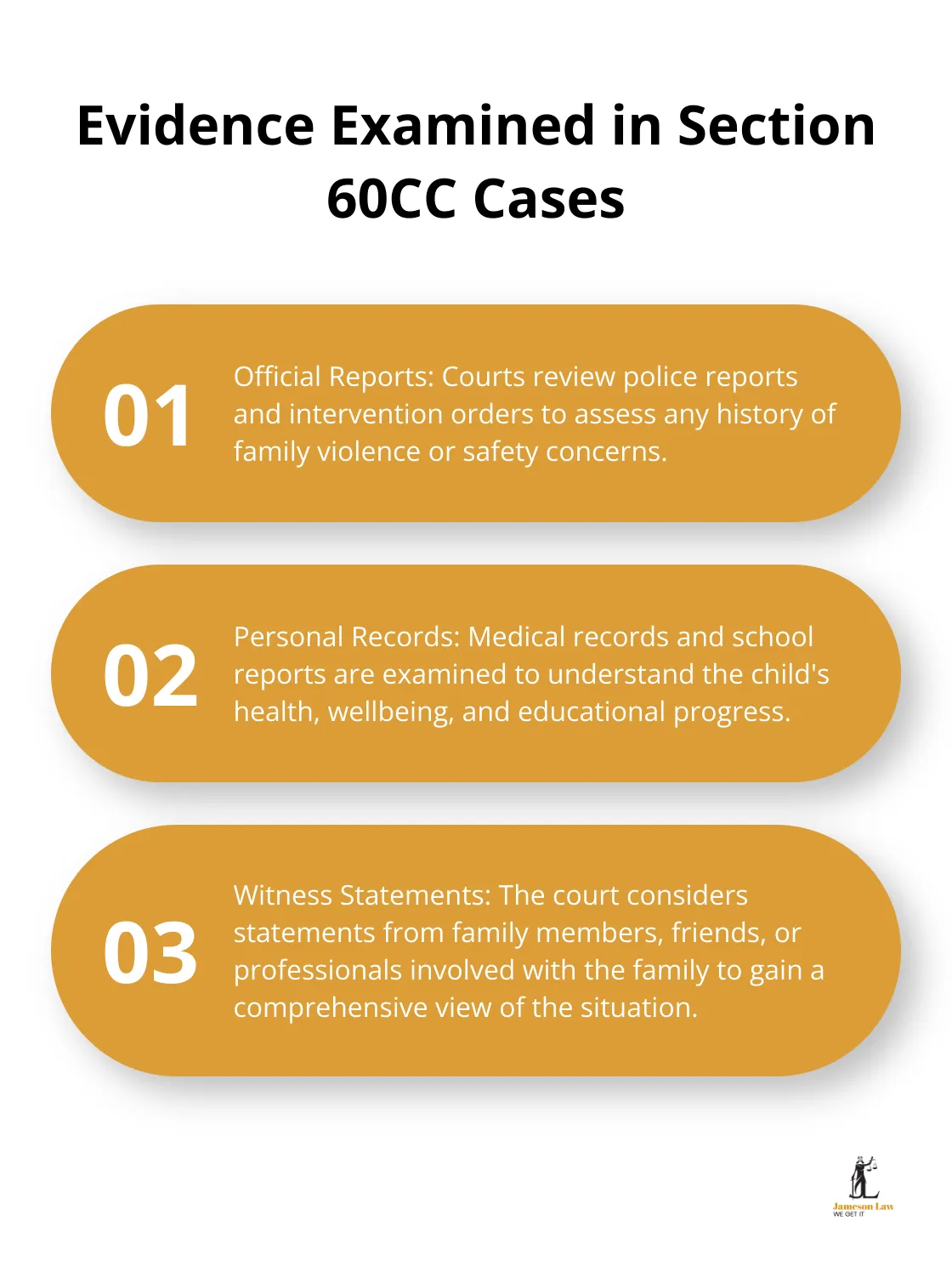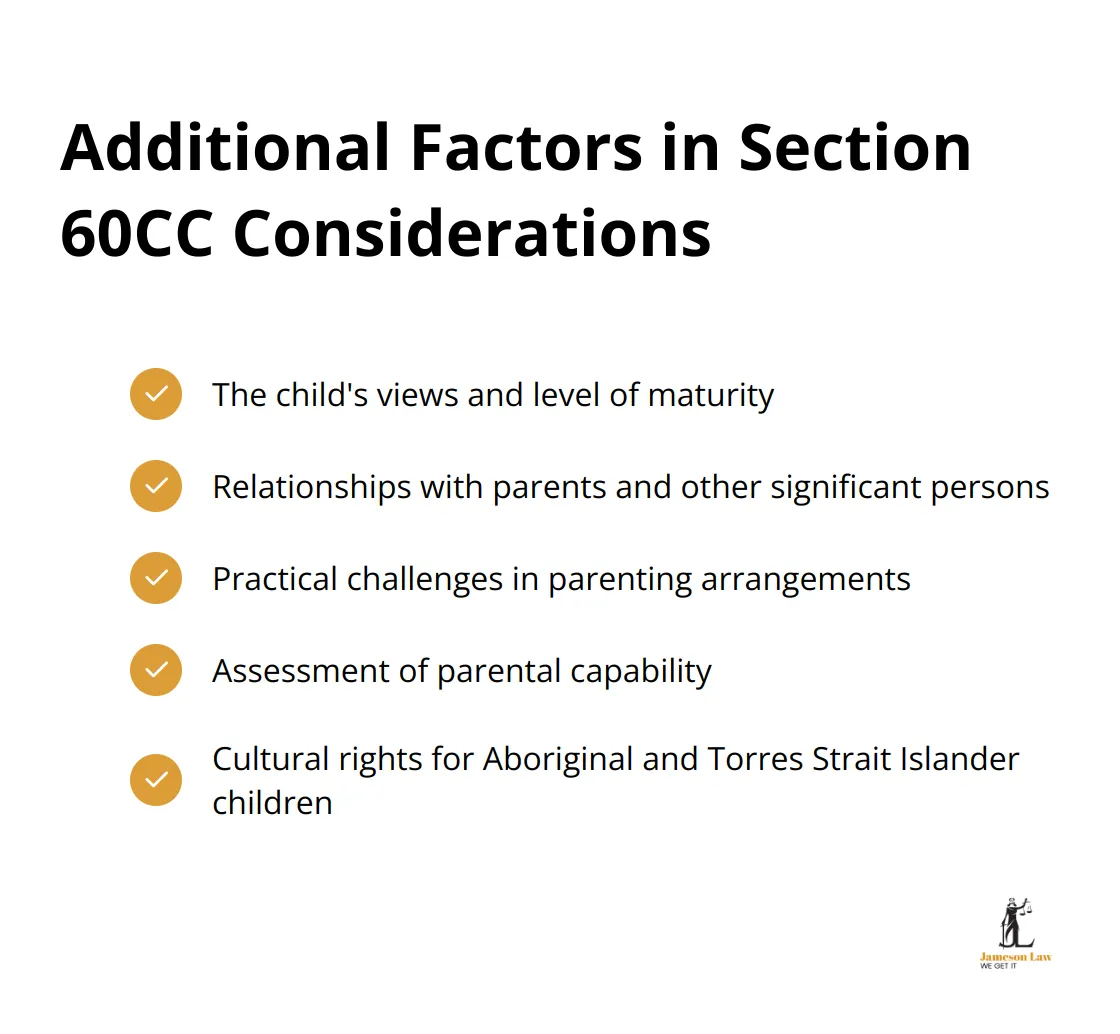Navigating the complexities of family law can be challenging, especially when it comes to understanding crucial sections like s60CC of the Family Law Act.
At Jameson Law, we recognise the importance of this section in determining parenting arrangements and protecting children’s best interests.
This blog post will break down the key aspects of s60CC, helping you grasp its significance in family law matters.
What Does Section 60CC of the Family Law Act Cover?
The Foundation of Family Law in Australia
The Family Law Act 1975 serves as the cornerstone of family law in Australia. This comprehensive legislation governs a wide range of family-related issues, including divorce, property settlement, and parenting arrangements. At its core lies Section 60CC, a vital component that guides courts in determining the best interests of children in family law cases.
Section 60CC outlines the factors courts must consider when deciding on parenting arrangements. Its primary purpose is to ensure that the child’s best interests remain the top priority in all decisions. This section provides a framework for judges to make consistent and fair decisions across various cases.
Primary Considerations: The Key Factors
Recent amendments to the Family Law Act have streamlined the decision-making process. Courts now focus on key factors when determining a child’s best interests:
- The benefit of the child having a meaningful relationship with both parents
- The need to protect the child from physical or psychological harm
These factors help the court balance the importance of maintaining relationships with both parents against the paramount need for the child’s safety and well-being.

Cultural Considerations for Indigenous Children
Section 60CC now includes specific provisions for Aboriginal and Torres Strait Islander children. Subsection 60CC(3) provides an additional factor for Aboriginal or Torres Strait Islander children, requiring the court to consider the child’s right to enjoy their culture and maintain connections with their cultural heritage. This recognition of cultural identity marks a significant step towards more inclusive and culturally sensitive family law practices.
The Heightened Focus on Family Violence
The amendments have strengthened the focus on family violence. Courts now give greater weight to protecting children from harm, including exposure to family violence. This shift reflects the growing awareness of the long-term impacts of domestic violence on children’s development and well-being.
Understanding Section 60CC can significantly impact the outcome of parenting disputes. It’s not just about knowing the law; it’s about presenting your case in a way that addresses these key considerations effectively. While Section 60CC provides a framework, each case is unique. The court will always examine the specific circumstances of your family situation.
As we move forward, let’s explore how these primary considerations are weighed and applied in real-world scenarios, shedding light on the practical implications of Section 60CC in family law matters.
How Courts Apply Section 60CC
Balancing Primary Considerations
Section 60CC of the Family Law Act provides courts with a framework to determine a child’s best interests when making parenting orders. This section contains six “general considerations” and two “additional considerations” regarding Aboriginal and Torres Strait Islander children.
The first consideration focuses on the benefit to the child of having a meaningful relationship with both parents. This recognises the importance of children maintaining strong connections with both mother and father, even after separation or divorce.
The second consideration addresses the need to protect the child from physical or psychological harm (including exposure to abuse, neglect, or family violence). This factor acknowledges the devastating impact that family violence and abuse can have on children’s wellbeing and development.
Courts often face challenges when balancing these two considerations, especially in cases involving allegations of family violence or abuse. A 2019 study by the Australian Institute of Family Studies into parenting arrangements after separation determined that in both court and non-court cases, certain factors were considered.
Evidence Evaluation
When applying Section 60CC, courts meticulously examine all available evidence. This may include:
- Police reports and intervention orders
- Medical records
- School reports
- Psychological assessments
- Witness statements from family members, friends, or professionals involved with the family
Parents must provide clear, factual evidence to support their case. The court will likely disregard vague allegations or unsubstantiated claims.

Influence on Parenting Orders
The court’s interpretation of Section 60CC significantly influences the type of parenting orders made. For example, if credible evidence of family violence exists, the court might order supervised visits or (in extreme cases) no contact at all with the abusive parent.
Conversely, if both parents can provide a safe and nurturing environment, the court will more likely order shared parental responsibility and substantial time with both parents.
Seeking Professional Guidance
Understanding how courts apply Section 60CC proves vital for anyone involved in a parenting dispute. It helps parents focus on the most relevant factors and present their case effectively. However, the complexity of these cases often necessitates professional legal advice to navigate the intricacies of family law and achieve the best outcome for children.
As we move forward, we’ll explore the additional considerations outlined in Section 60CC that courts take into account when determining a child’s best interests.
What Else Do Courts Consider in Section 60CC?
Section 60CC of the Family Law Act extends beyond primary considerations to include additional factors that courts must evaluate when determining a child’s best interests. These additional considerations provide a more comprehensive view of the child’s circumstances and help courts make well-rounded decisions. As of August 21, 2024, Section 60CC(3) requires the court to consider an Aboriginal or Torres Strait Islander child’s right to enjoy their culture.
The Child’s Voice in Legal Proceedings
Courts consider the child’s views and level of maturity. While children don’t make the final decision, their opinions can significantly influence the outcome.
Courts don’t automatically follow a child’s wishes. They assess the child’s maturity and understanding of the situation. For instance, a 15-year-old’s views might carry more weight than those of a 7-year-old. Courts also consider whether either parent has influenced the child’s views.
Relationships and Their Impact
The nature of the child’s relationship with each parent and other significant persons (such as grandparents or siblings) is another key consideration. Courts examine the quality of these relationships and how they contribute to the child’s emotional wellbeing.
Practical Challenges in Parenting Arrangements
Courts also take into account the practical difficulties and expenses associated with a child spending time with a parent. This is particularly relevant in cases where parents live far apart. If one parent moves interstate, the court will consider factors such as:
- The cost of travel and who will bear this expense
- The impact of long-distance travel on the child’s schooling and routine
- The feasibility of maintaining regular contact through technology
These practical considerations ensure that the parenting arrangements are not just theoretically sound but also workable in real-life situations.

Assessing Parental Capability
The court evaluates each parent’s ability to provide for the child’s needs. This includes both financial capacity and emotional availability. Courts examine factors such as:
- Each parent’s work commitments and flexibility
- Their ability to provide a stable home environment
- Their willingness to facilitate the child’s relationship with the other parent
Parenting arrangements after separation are complex, and courts consider a wide range of factors to ensure the best interests of the child are met.
Final Thoughts
Section 60CC of the Family Law Act shapes how courts view parental roles, relationship maintenance, and child safety in parenting disputes. This section influences custody arrangements and visitation schedules, always prioritising the child’s wellbeing. The complexities of s60CC Family Law Act often require expert interpretation to achieve the best possible outcome for families.
Professional legal advice proves essential when navigating the intricacies of family law, especially during emotionally charged times. Every family situation presents unique challenges that demand tailored legal support. Jameson Law offers experienced lawyers who can provide guidance through the complexities of Section 60CC and beyond.
Our team at Jameson Law dedicates itself to achieving optimal outcomes in family law cases. We stand ready to help you protect your child’s best interests throughout the legal process. Our expertise allows us to apply the knowledge of Section 60CC effectively to your specific circumstances.













